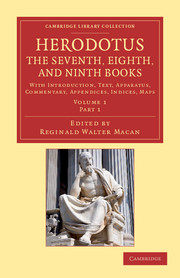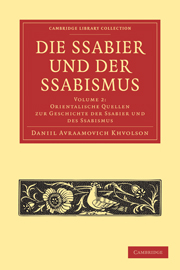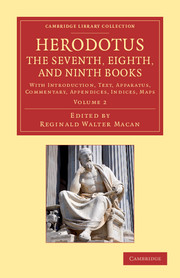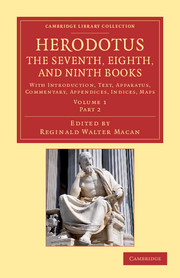Refine search
Actions for selected content:
23990 results in Ancient history
7 - Tacitus: The political psychology of despotism
-
- Book:
- Roman Political Thought
- Published online:
- 05 August 2014
- Print publication:
- 28 July 2014, pp 321-357
-
- Chapter
- Export citation
Acknowledgments
-
- Book:
- Roman Political Thought
- Published online:
- 05 August 2014
- Print publication:
- 28 July 2014, pp xvii-xviii
-
- Chapter
- Export citation
3 - Sallust: Giving endurance to memory
-
- Book:
- Roman Political Thought
- Published online:
- 05 August 2014
- Print publication:
- 28 July 2014, pp 145-179
-
- Chapter
- Export citation
1 - Cicero: To save theres publica
-
- Book:
- Roman Political Thought
- Published online:
- 05 August 2014
- Print publication:
- 28 July 2014, pp 26-92
-
- Chapter
- Export citation
8 - Marcus Aurelius and theCosmopolis
-
- Book:
- Roman Political Thought
- Published online:
- 05 August 2014
- Print publication:
- 28 July 2014, pp 358-381
-
- Chapter
- Export citation
Contents
-
- Book:
- Roman Political Thought
- Published online:
- 05 August 2014
- Print publication:
- 28 July 2014, pp vii-x
-
- Chapter
- Export citation
6 - Seneca and jurisdiction
-
- Book:
- Roman Political Thought
- Published online:
- 05 August 2014
- Print publication:
- 28 July 2014, pp 271-320
-
- Chapter
- Export citation
2 - Lucretius: The poetics of power
-
- Book:
- Roman Political Thought
- Published online:
- 05 August 2014
- Print publication:
- 28 July 2014, pp 93-144
-
- Chapter
- Export citation
5 - Livy: political thought asremedium
-
- Book:
- Roman Political Thought
- Published online:
- 05 August 2014
- Print publication:
- 28 July 2014, pp 229-270
-
- Chapter
- Export citation
Dedication
-
- Book:
- Roman Political Thought
- Published online:
- 05 August 2014
- Print publication:
- 28 July 2014, pp v-vi
-
- Chapter
- Export citation

Herodotus: The Seventh, Eighth, and Ninth Books
- With Introduction, Text, Apparatus, Commentary, Appendices, Indices, Maps
-
- Published online:
- 05 July 2014
- Print publication:
- 17 January 2010
- First published in:
- 1908

Die Ssabier und der Ssabismus
-
- Published online:
- 05 July 2014
- Print publication:
- 19 May 2011
- First published in:
- 1856

Herodotus: The Seventh, Eighth, and Ninth Books
- With Introduction, Text, Apparatus, Commentary, Appendices, Indices, Maps
-
- Published online:
- 05 July 2014
- Print publication:
- 13 April 2010
- First published in:
- 1908

Herodotus: The Seventh, Eighth, and Ninth Books
- With Introduction, Text, Apparatus, Commentary, Appendices, Indices, Maps
-
- Published online:
- 05 July 2014
- Print publication:
- 17 January 2010
- First published in:
- 1908
10: - Roman Religion
- from Part 2 - Roman Society
-
-
- Book:
- The Cambridge Companion to the Roman Republic
- Published online:
- 05 June 2014
- Print publication:
- 23 June 2014, pp 213-230
-
- Chapter
- Export citation
6: - Women in the Roman Republic
- from Part 2 - Roman Society
-
-
- Book:
- The Cambridge Companion to the Roman Republic
- Published online:
- 05 June 2014
- Print publication:
- 23 June 2014, pp 127-148
-
- Chapter
-
- You have access
- HTML
- Export citation
8: - The Republican Economy and Roman Law: Regulation, Promotion, or Reflection?
- from Part 2 - Roman Society
-
-
- Book:
- The Cambridge Companion to the Roman Republic
- Published online:
- 05 June 2014
- Print publication:
- 23 June 2014, pp 167-186
-
- Chapter
- Export citation
Part 2 - Roman Society
-
- Book:
- The Cambridge Companion to the Roman Republic
- Published online:
- 05 June 2014
- Print publication:
- 23 June 2014, pp 99-230
-
- Chapter
- Export citation
Contents
-
- Book:
- The Cambridge Companion to the Roman Republic
- Published online:
- 05 June 2014
- Print publication:
- 23 June 2014, pp vii-x
-
- Chapter
- Export citation
9: - The Great Transformation: Slavery and the Free Republic
- from Part 2 - Roman Society
-
-
- Book:
- The Cambridge Companion to the Roman Republic
- Published online:
- 05 June 2014
- Print publication:
- 23 June 2014, pp 187-212
-
- Chapter
- Export citation
